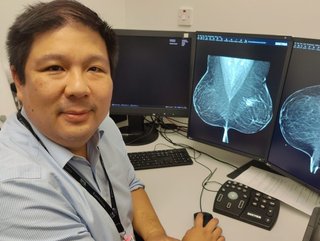AI Tool 'Picks up Early-stage Breast Cancers Doctors Missed'

An AI tool tested by the UK’s National Health Service (NHS) in Scotland has identified ultra-early signs of breast cancer in 11 women that had been missed by clinicians.
The tool, called Mia, was piloted alongside NHS Grampian doctors, and analysed the mammograms of over 10,000 women. Mia is developed by London-based Kheiron Medical Technologies, and the solution is supported by Microsoft’s Azure Cloud.
Most of the cases were cancer-free, but Mia successfully flagged all of those with symptoms, as well as an extra 11 the doctors did not identify, because at very early stages cancers can be extremely small and hard to spot.
Yet crucially, breast cancer patients with tumours smaller than 15mm at the time of discovery have a 90% five-year survival rate.
Another factor affecting detection is that on average cancer shows up in just six-in-a-thousand scans. This is why in the UK and in Europe two specialists read every mammogram.
Yet occasionally, so-called ‘interval’ cancers are missed at the time of screening, or occur after screening. Kheiron Medical Technologies says that, over a three-year period, Mia could be expected to pick up 47 cases (33.8%) of interval cancers that would be missed by clinicians.
AI cancer-scan tools 'have high detection rate'
The company adds that, over the same period:
- Two specialists reading mammograms would detect 303 cancers
- A single specialist reading would detect 261
- Mia reading scans alone would pick up 271 instances of cancer
Kheiron says that because it works instantly the tool, and others like it, can also reduce waiting times for results from 14 days to three.
This is crucial, not only for hospitals in the UK but also worldwide, where the pandemic has caused major screening backlogs. In the UK, more than two million women have a breast cancer screening each year but the pandemic, coupled with staff pressures, mean there are long waiting lists and a backlog of mammograms to be read.
The Grampian NHS Trust hopes to show that using an AI alongside a highly trained radiologist will cut waiting times both for screenings and the results.
It is also normal practice for two radiologists to study each scan. The hope now is that Mia, and tools like it, can halve workloads by replacing one radiologist.
Sarah Kerruish, Chief Strategy Officer of Kheiron Medical Technologies, reveals that it took six years to build and train Mia, and that it was trained on “millions of mammograms from women all over the world”.
She added: “AI tools are generally pretty good at spotting symptoms of a specific disease, if they are trained on enough data to enable them to be identified.
“This means feeding the programme with as many different anonymised images of those symptoms as possible, from as diverse a range of people as possible.
"I think the most important thing I've learned is that when you're developing AI for a healthcare situation, you have to build in inclusivity from day one."
Unlike clinicians, AI 'not prone to exhaustion'
The clinician in charge of the trial, Dr Gerald Lip – Clinical Director of Breast Screening, North West Scotland – told the BBC that of the 10,889 women who took part in the trial, just 81 did not want the AI tool to review their scans.
He added that part of the power of AI is it’s not prone to exhaustion or distraction.
With breast cancer doctors reading around 5,000 breast scans a year, and as many as 100 in a single session there “is an element of fatigue", said Dr Lip.
He added: "You also get disruptions. Someone's coming in, someone's chatting in the background. There are lots of things that can throw you off your regular routine."
Dr Lip added that he hoped one day, AI tech like Mia one day would “free me up to spend more time patients”.
"I see Mia as a friend and an augmentation to my practice," he added. “Mia isn't perfect. It had no access to patient history so would flag cysts that had already been identified by previous scans and designated harmless.”
He also revealed that because of UK health regulation, the machine learning element of Mia was disabled, which means it could not learn on the job, or evolve during its use.
The University of Aberdeen independently validated Grampian NHS Trust’s research, but the results are yet to be peer reviewed.
The Royal College of Radiologists, meanwhile, says the tech has “potential”.
Mia is just one way in which AI technology is changing how healthcare is being delivered.






